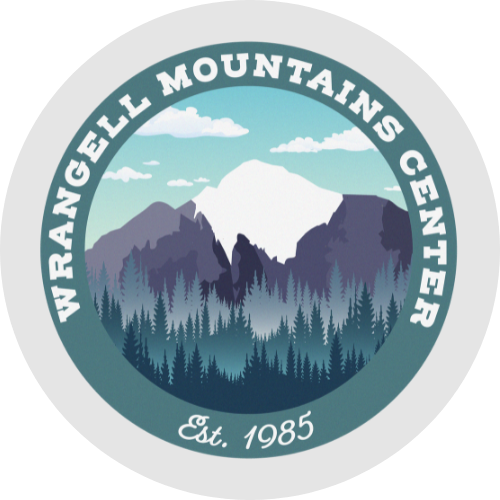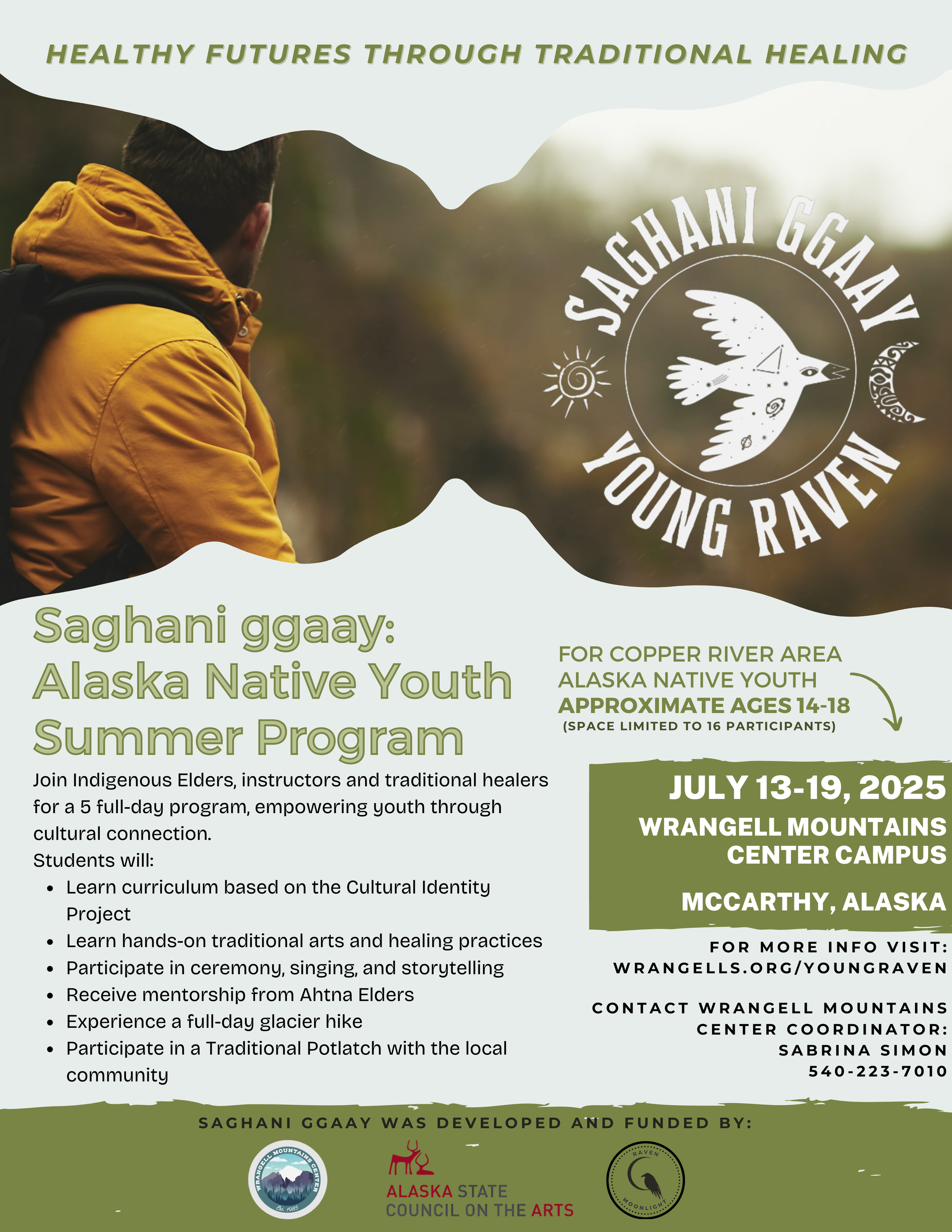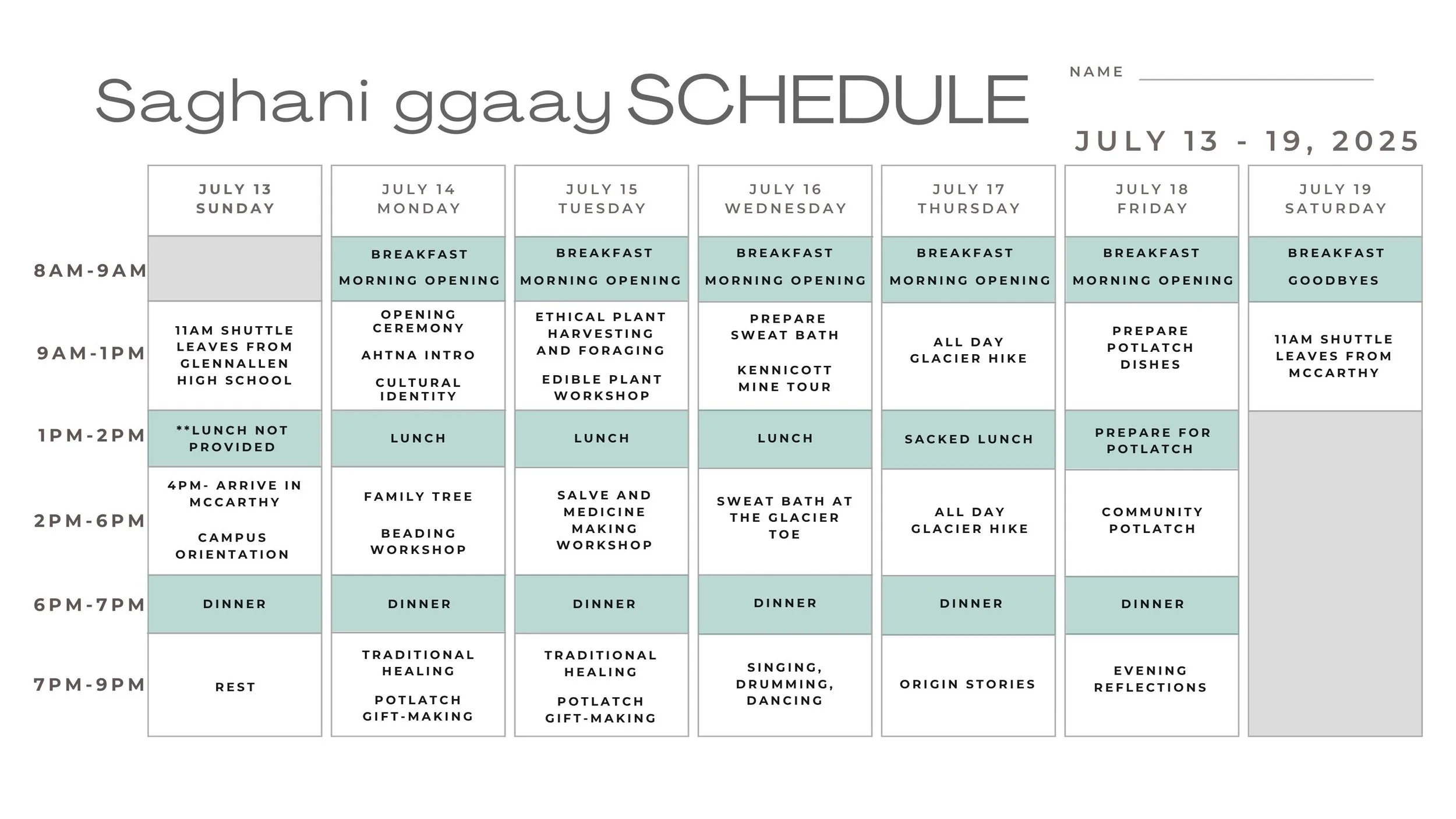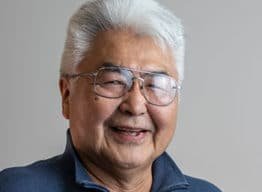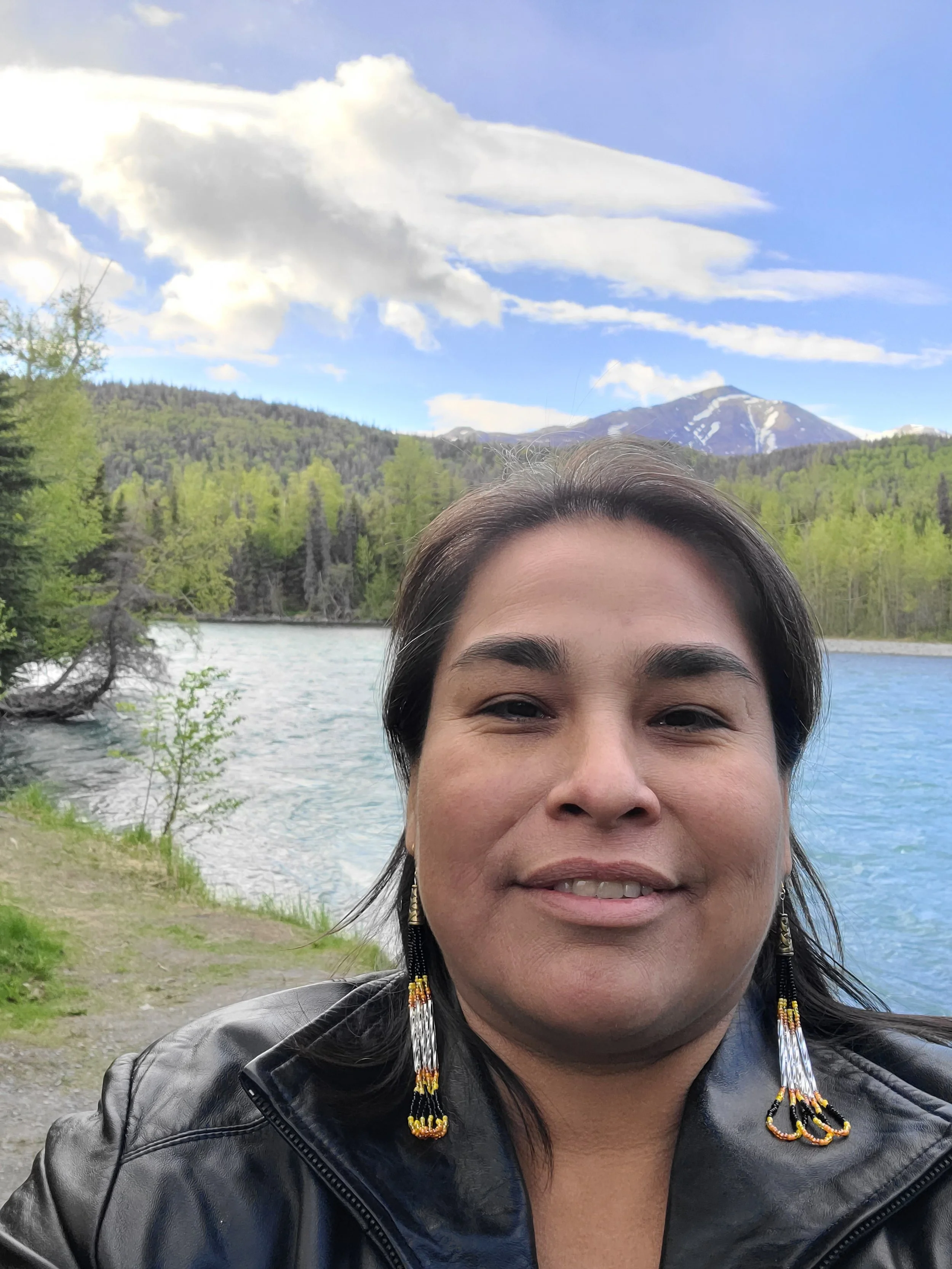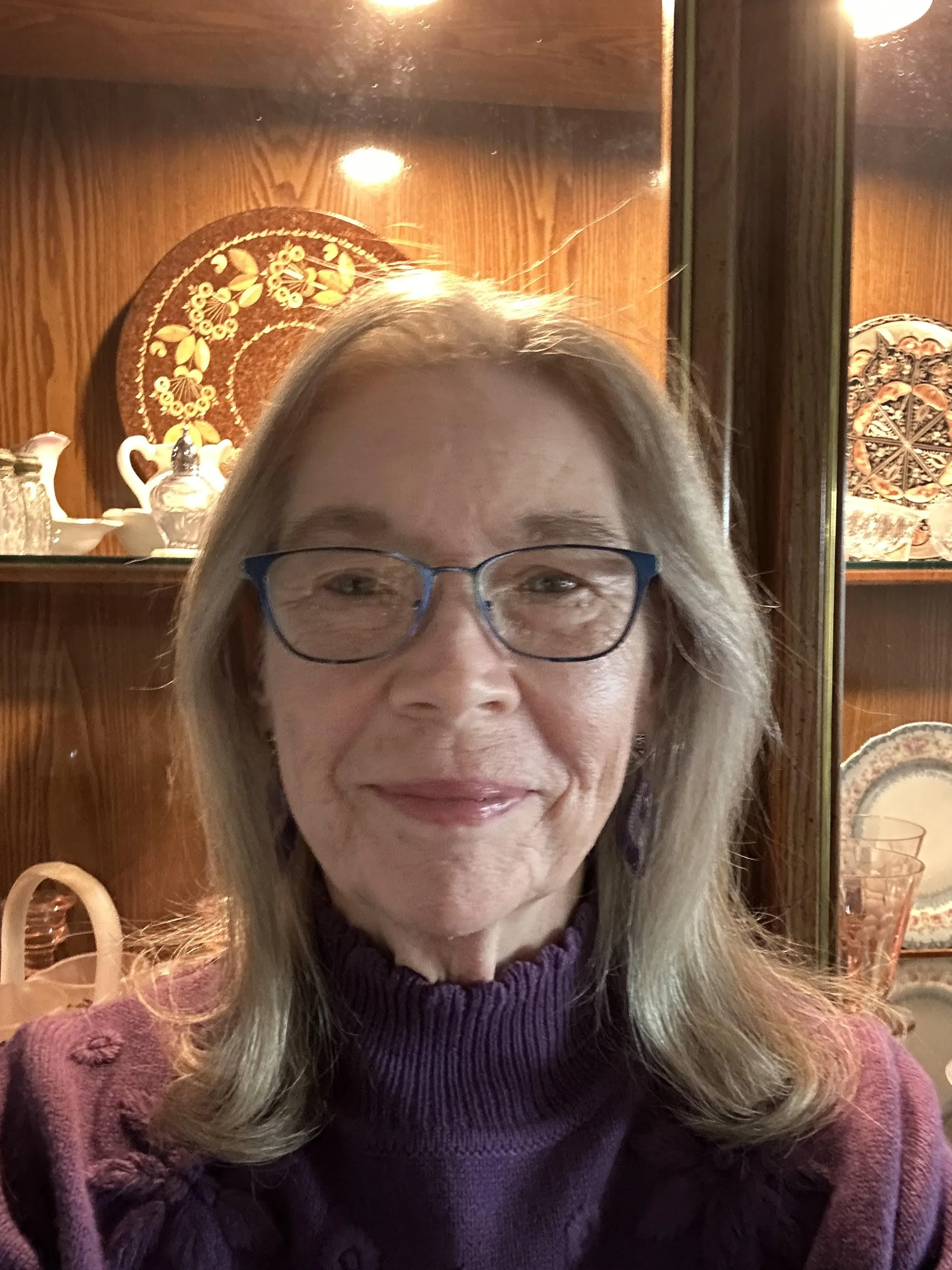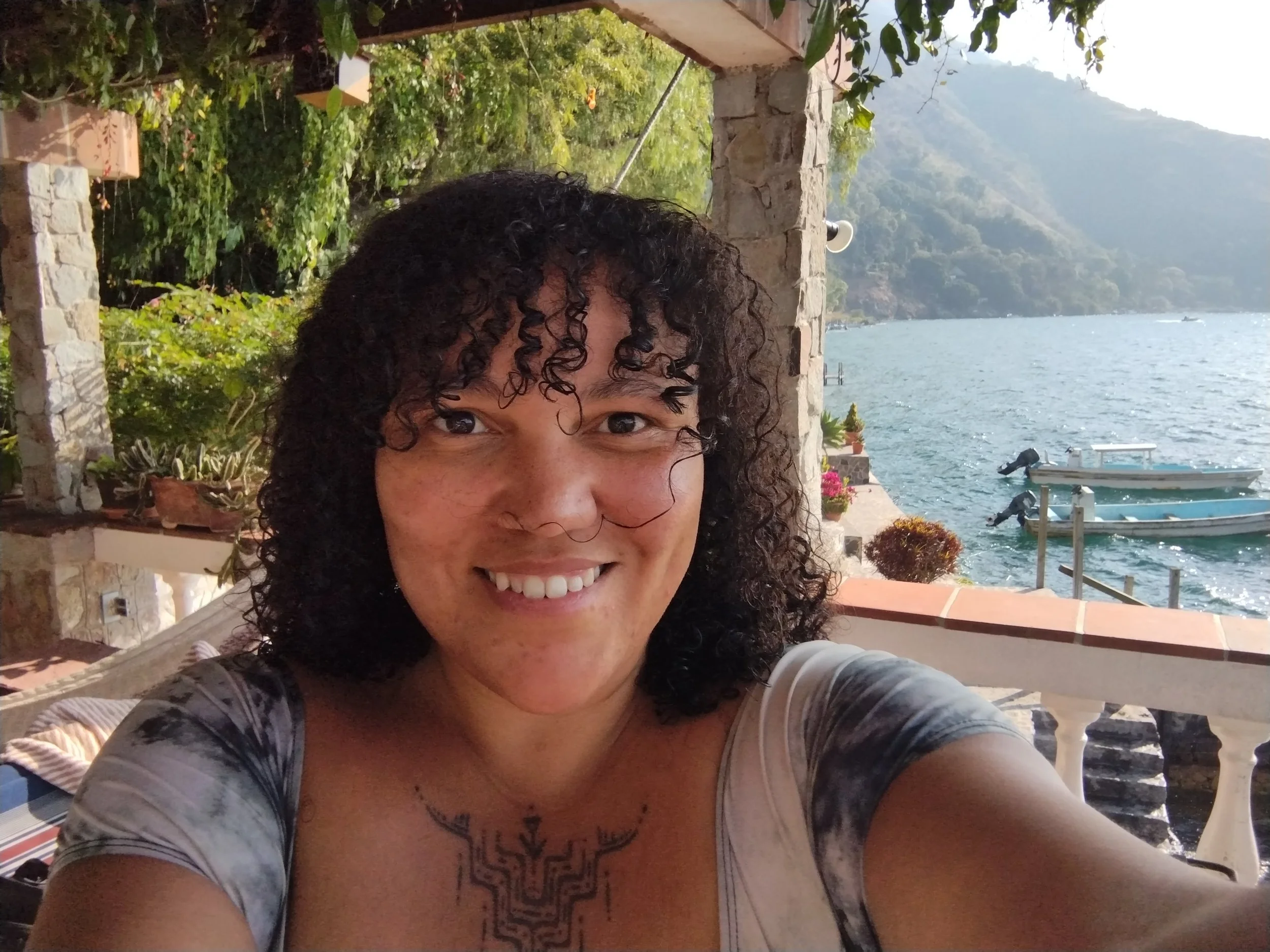Saghani ggaay (Young Raven)
Alaska Native Youth Summer Program
July 13-19, 2025
Wrangell Mountains Center Campus
McCarthy, Alaska
Overview
Raven Moonlight is an Alaska Native and women-led nonprofit organization whose mission is to provide culturally appropriate holistic healing, implementing diverse methodology and approach.
The Wrangell Mountains Center (WMC) is a nonprofit organization whose mission is connecting people with wildlands through art, science, and education in Alaska.
Spearheaded by Raven Moonlight and Hereditary Clan Leader, Wilson Justin, and with the support of the WMC, the Saghani ggaay youth program’s aim is to empower Alaska Native youth through cultural connection.
Led by Indigenous Elders and Educators, participants (ages 14-18) will spend 6 nights and 5 full days in the vast and awe-inspiring landscapes of the Wrangell- St.Elias National Park and on the WMC campus. Students will take part in hands-on educational activities led by Indigenous Educators with a focus on reconnection to heritage, traditional healing practices, place-based relationship, and Ahtna history of the Wrangells. They will also take part in a full-day guided glacier hike provided by local guiding company, Kennicott Wilderness Guides.
The program is now full
Schedule
Transportation, Accommodation, and Meals
The Wrangell Mountains Center will provide student participants with shuttle transportation to and from Glennallen High School on July 13th and 19th, all meals while on campus, meetings spaces for talks and workshops, and bunkhouse-style accommodations in our Porphyry Place Cabin and in our 10X20 large canvas tent. Please note that our campus is fully off-grid and fairly rustic, so come prepared!
Accommodations include:
Wood Stove in bunkhouse spaces (operated by designated student or chaperone)
Cot with mattress topper or single bedframe with mattress for each participant
Fitted and flat sheet, pillow and pillow case
Outdoor bucket shower (hot water provided)
Outhouses
Large dining hall
Classroom space
Full industrial kitchen for food processing and preparation for potlatch and/or workshops
Mostly vegetarian meals (all provided except for a sacked lunch on July 13th)
The Setting



















Our campus, located in the center of McCarthy, a small mountain community, and within the boundaries of the nation’s largest unit of the national park system (over 13 million acres), provides a unique natural environment for the WMC. Positioned near ice-capped mountains, the roaring Kennicott River and McCarthy Creek, and the raw terminus of the Kennicott Glacier, the local landscape is a dynamic laboratory for ecology, glaciology, and geology. The town of McCarthy was established during the copper mining period in the early 20th century. After the local copper mines were abandoned in the 1930s, the once booming community virtually became a ghost town, but as the national park was established in the 1980s and with the growth of local tourism, McCarthy has been rediscovered by everyone from Alaskans to international travelers.
The WMC hosts many community events including Word Jam, Wrangell Mountains Storytelling Festival, Artist in Residence, Geology Camp, and our Summer Arts and Lecture Series.
What To Bring:
Please remember to pack as light as possible for the ease of transportation and limited space. For your comfort, we suggest that you pack these items:
SLEEPING BAG - Mandatory. The WMC does not provide blankets for beds.
WALKING SHOES or HIKING BOOTS
SOCKS - wool or synthetic (not cotton) socks for use with your hiking boots.
BASE LAYERS - Leggings/tights and base layers for the upper body are very helpful when temps get chilly. July weather is usually warm but still unpredictable!
LONG PANTS - Another form of mosquito repellent!
LONG-SLEEVE SHIRTS - Mosquitoes will bite through thin, single layered tops.
MOSQUITO/BUG HEAD NET - You can either spray your face and neck in bug spray every couple hours or wear a head net when in dense mosquito habitat.
HATS & CAPS
UNDERWEAR - Bring plenty! Students will only be able to hand wash their clothes
RAIN JACKET and RAIN PANTS
WARM COAT - Depending on weather!
SWIMSUIT - There is a swimming hole for students to enjoy, and they will need one for the Steam Bath
TOWEL
HEAD LAMP - We only use natural lighting in many spaces!
ANY GIFTS, CEREMONIAL ITEMS, REGALIA, KEEPSAKES, ETC - If you would like to contribute items to the Potlatch or bring special items to our ceremonial activities
JOURNAL - We encourage self-reflection!
Meet the Team
Wilson Justin
Hereditary clan leader, keeper of sacred stories, ahtna elder
Wilson Justin was born midcentury in Nabesna Alaska, a village later abandoned to comply with the educational requests of the Bureau of Indian Affairs. The family endured a decade of hardships in Chistochina and Mentasta Village but returned to the homelands for the summer months. As an adventurous youngster, Wilson Justin was prone to chase shadows and was on the road by the age of fourteen. Threatened with receivership at the Children’s Home in Fairbanks, he returned to Mentasta Village in 1965 and soon after followed the rest of the family to Anchorage, graduating from West Anchorage High School in 1968.
After high school, Wilson had aspiration of joining the Army but did not pass his physical due to tinnitus. Once the Army was no longer a viable option, Wilson began thinking of what kind of a career could be fashioned for an Athabascan with just a high school diploma. There were no instructions in the sudden transition from a Traditional Society to a one descended from an English speaking world. Wilson had a natural curiosity of the world and soon was able to join the ANCSA Corporation for his region as a Land Planner Trainee in 1977.
Wilson has advised federal agencies such as the United States Environmental Protection Agency (USEPA) on issues around environmental program capacity building. In the early 1990s USEPA began writing the Indian Environmental General Assistance Program statute (IGAP Act of 1992). Wilson played a critical role in the initial structuring of this program and its evolution over the years as a group from just a handful of grants to tribal governments to what it is today with over $27 million in region 10 (Alaska) and over 125 tribes state wide choosing to partner on this program. He has directed IGAP programs including Mount Sanford’s environmental program overseeing the development of a successful regional recycling program. Wilson has professionally attended conferences for decades. He has led numerous discussions on climate change as an acclaimed speaker during interdisciplinary conferences such as the Alaska Forum on the Environment. The publication titled “Alaska Forum on the Environment- Climate Change: Our voices, Sharing our Ways Forward,” became a component of the US Department of the Interior, US Geological Survey, United States National Climate Assessment, Alaska Technical Regional Report (Circular 1379).
Sonia Vent
Saghani ggaay Program Coordinator
Sonia is the co-founder and President of Raven Moonlight nonprofit, is of Koyukon Athabascan descent from the Interior of Alaska. She practices Traditional Healing and is an advocate for community wellness. She has formal training as a Physician Assistant and as a Healing Touch Therapist. She has worked with nonprofit organizations promoting the well-being of Alaska Native people and is the owner of Sacred Space, a small business. Sonia’s focus is on healing, as the healing of one is the healing of all.
Sonia has an interest in sustainability especially the Alaska Native subsistence way of life and the many ways of staying holistically well through food hunting, gathering, and growing. Sonia’s late mother, Lorna was a cultural bearer and a language carrier. Sonia’s hope is to carry this legacy forward through language and traditional Koyukon Athabascan culture in general.
Sonia was born and raised in the village of Huslia and currently resides in Anchorage. She has one living son and three grandchildren.
Ashley Marion Hicks-Martin
Instructor
Ugheli dzaen (Good day)! My name is Ashley Marion Hicks-Martin. I am the mother of Dez’aiah and wife of James of Kluti-Kaah. My clan is Niisuu. I am originally from Northway but was raised in the Copper River region most of my life. I am Choctaw, and Upper Tanana & Ahtna Athabascan. I graduated from Glennallen High School at the age of 16 and have been attending college on and off for a time. I received 2 Associate degrees at PWSC and I am currently a senior in college pursuing a Bachelor’s of Business Administration and halfway to receiving an Occupational Endorsement in Ahtna Language Certification through the University of Alaska.
My mother is Elaine Sam-Sanford (Theodore Sanford) and my father is the late Joeneal Hicks. My maternal grandparents are Julius Sam and paternal grandparents are Joe & Ruth Hicks. I am the great-granddaughter of Frank & Annie Sam and Fred & Katie John. I work full-time for CRSD as their Migrant Education Coordinator and part-time for ROAR as their Coordinator. I also run a few small businesses from home in Glennallen. My parents taught me from a young age that boredom does not exist and ever since, I have learned to remain on-task and productive. I was raised to live off the land, to subsist, to harvest and to value and protect the land, animals and its resources by my father. My mother taught me how to bead and both taught me to be self-sufficient and not to rely on others. Today, I honor my ancestors by sharing the values that have been passed on to me in an effort to preserve, promote and prevent the loss of language, culture and traditions. For the past year, I have been actively teaching and sharing Native language and traditional beadwork practices with school staff and students in an effort to promote healing and strengthen relationships to each other.
Georgia Jackson
Instuctor
Georgia Jackson is the Indian Education Family and Student Liaison for the Copper River School District. She is a Tl’aticae’e (Native Village of Kluti-Kaah) tribal member, of the Ahtna region in Alaska. Her parents are Clarence and Kathy McConkey, and her grandparents are Clarence McConkey and Marie Craig and Hector and Grace Ewan. She was born and raised, and currently resides in Copper Center, Alaska, and has 6 children, 3 Godchildren, and a grandchild. Georgia was a homemaker and was able to work with her Elders for 13 years. She really values this time of her life to be able to spend time with and learn from so many Elders in the Ahtna region. Georgia strives to teach her children and younger family members about the Ahtna culture whenever she is able. In her current job position she is able to learn more about the Ahtna culture and to turn them into lessons that can be taught in the school.
Sally Caldwell
Licensed Professional Counselor
Sally Caldwell was born and raised in Oklahoma influenced by the values and practices of her mother and grandmother, Choctaw. “Halito.” Her focus is to connect with traditional values and practices through relationship with parents and grandparents and support children and youth in the discovery of their own resilience. Sally incorporates concepts from Positive Indian Parenting, developed by the National Indian Child Welfare Association. She brings forward her learnings from families while working in tribal behavioral health.
Sally is mother and grandmother. She gives thanks,” Yakoke”, to Alaska traditional healers, working side by side using body/mind practices in individual healing processes. She says she has lived a long time in Alaska and is grateful to the people as stewards of this land, enabling her to connect with the Creator Who brings comfort and wisdom to carry on.
tsin'aen
Sabrina Simon
Director of Operations Wrangell mountains Center
Sabrina is a grief-tender, Thai massage practitioner, a world traveler, an intentional community communard and has aspirations of contributing to a more connected and more just post-capitalist society. She is passionate about creating community, healing relationships with Mother Nature, singing, ritual and creating sacred space for individual and collective healing, growth, and connection.
Professionally, she is passionate about nonprofit work that focuses on deconstructing mainstream culture and shifting towards cooperation while creating greater access to education and programs for people of marginalized backgrounds. She recently returned to the states from Peru and is excited about continuing her intentional community tour which will take her to Portugal in the fall. She feels deeply honored to be working with the Saghani ggaay team in her administrative and organizational role and is hopeful that she can be of great service to the program and it’s future iterations.
Saghani ggaay is sponsored in part by Alaska State Council on the Arts, Alaska Mental Health Trust Authority, RurALcap Foundation, and the Copper River School District Migrant Education Program.
